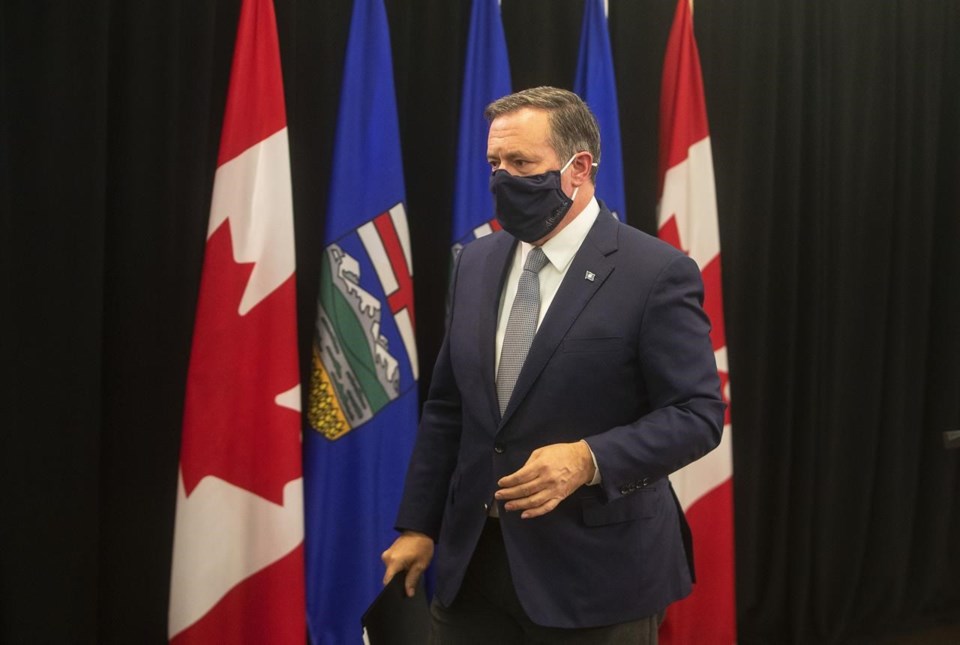CALGARY — Premier Jason Kenney says there are early signs Alberta has "reached and surpassed" peak COVID-19 cases in the fifth wave as provincial hospitalizations surge to numbers never seen before.
But Kenney warned that while cases are likely to decline, hospitalizations will continue to increase and put more pressure on an already overwhelmed health system.
"If the (Omicron) variant performs in Alberta like it has in jurisdictions all around the world, we can reasonably expect that we may now be beginning on the downslope of transmission," he said Thursday in Calgary.
Kenney said the "encouraging news" comes from wastewater modelling that shows many communities with less transmission, in addition to declining test positivity rates.
"Based on the velocity of growth, we do know ... there will be a lag between the peak in infections and the peak in hospitalizations," said Kenney, estimating a two-week delay. "We can reasonably expect to see 1,500 or more COVID patients in non-ICU beds."
To prepare for a swell of hospitalizations, the government said it is building additional bed capacity, maximizing the workforce with nursing students and opening COVID-19 community clinics.
There were more than 1,130 people in hospital Thursday for COVID-19 in the province, with 108 receiving intensive care. Hospitalizations are higher than at any other point of the pandemic.
Alberta Health Services CEO Dr. Verna Yiu said the number of patients receiving care for COVID-19 has increased by about 40 per cent over the last week. Admissions to intensive care have jumped by about 18 per cent.
There are also more health-care staff having to isolate than in previous waves, she added. About five per cent of AHS staff are off sick at any given time and between 18 and 20 per cent of shifts are being missed daily due to challenges related to the pandemic.
"It has been a long two years, but now is not the time to let your guard down," said Yiu.
"This is not another wave affecting only the unvaccinated ... while the risk of hospitalization and severe outcomes is lower if you're fully immunized, we are still seeing breakthrough cases."
She said the most significant impact is on emergency departments and inpatient beds for people facing a range of illnesses or injuries.
Dr. Shazma Mithani, an emergency room physician in Edmonton, said wait times are longer than she has seen in at least five years, with people waiting up to seven hours.
Mithani said she is worried, as this wave continues to engulf the health-care system, that people needing treatment for COVID-19 and other medical emergencies could have worse outcomes because of stretched wait times.
“Not only are we seeing a bigger volume of patients come in (but) we’re also seeing just a crunch with our bed capacity in emerg as well because of what else is going on in the rest of the hospital,” said Mithani.
“We’re trying to be creative and sometimes stretch the ratios and stretch staffing as best we can, but we are certainly seeing an increase in nursing staff and physicians taking time off.”
Mithani said there also needs to be stricter measures to curb COVID-19 spread, even if it is on the decline.
One change she is pushing for is an update to the Restrictions Exemption Program to require three shots, instead of two, and remove the allowance for negative rapid tests.
Additionally, she wants to see a ban on all large gatherings, such as hockey games, and better masking and filtration in schools.
There are no “silver bullets,” said Mithani. “It needs to be a multipronged approach.”
This report by The Canadian Press was first published Jan. 20, 2022.
Alanna Smith, The Canadian Press



